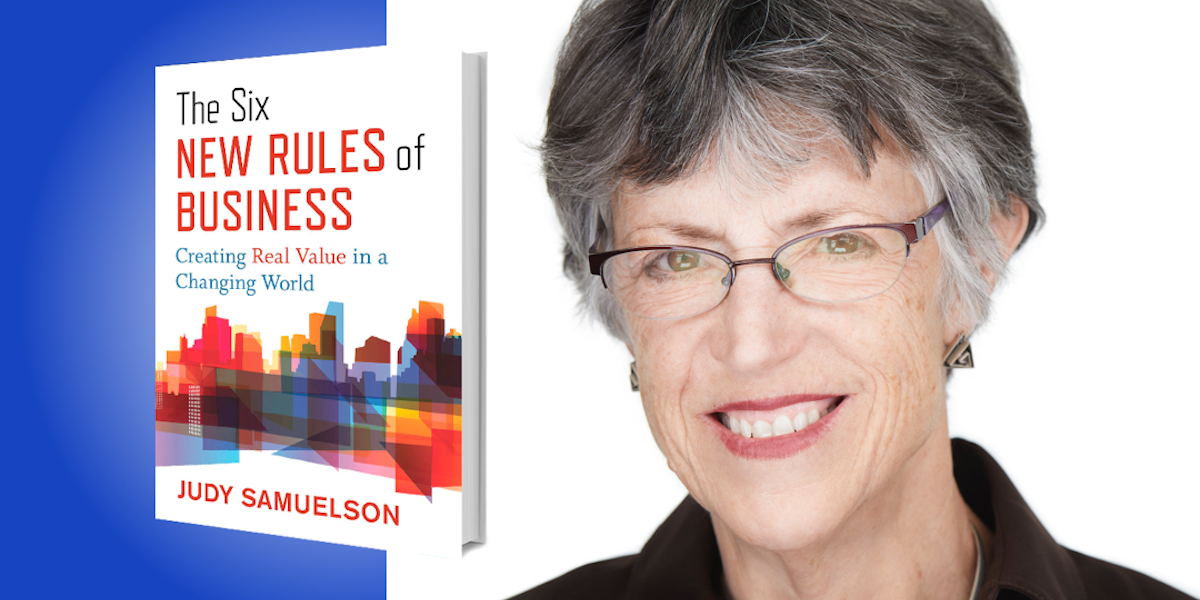Judy Samuelson is vice president at the Aspen Institute, and founder and executive director of the Aspen Institute Business and Society Program. She previously worked in legislative affairs in California and banking in New York’s garment center, and ran the Ford Foundation’s office of program-related investments. She also blogs for Quartz at Work and is director of the Financial Health Network.
Below, Judy shares 6 key insights from her new book, The Six New Rules of Business: Creating Real Value in a Changing World. Download the Next Big Idea App to enjoy more audio “Book Bites,” plus Ideas of the Day, ad-free podcast episodes, and more.
1. Trust, reputation, and other intangibles drive business value.
When I went to business school, I was taught to measure the value of a company by taking the hard assets, projecting the future values, and predicting revenues that would result from deploying those assets, then trying to roll it all back and capture it in today’s dollars. It was a hard asset world—but we no longer live in that predictable world. Today, the real value of the enterprise is hard to measure, and it can’t be found on a balance sheet. Reputation, trust, the ability to attract and retain talent—these are the things that drive business value.
2. Companies serve many purposes beyond shareholder value.
A company’s purpose is more than just a slogan—it’s revealed through how the company operates and makes decisions. This purpose signals long-term goals, and helps a business prevail over short-term pressures. As a business mentor of mine always says, “Motivated employees don’t get up in the morning to see how much money they can make for shareholders. They aim to create a good customer experience, to solve problems, or to build a quality product.” He would also say that profits are like oxygen; they’re necessary, but they’re not why we exist.
“Profits are like oxygen; they’re necessary, but they’re not why we exist.”
3. Corporate responsibility is defined outside the gate.
Responsibility is about much more than your carbon footprint, and it’s no longer totally within your control. An engaged public is hungry for your business to take a stand and use your power to influence the system. From deforestation to climate change and beyond, your responsibilities change with the ecosystem of labor markets. In an age of social media when both employees and change agents identify with concerns that defy easy answers, companies must play offense, not defense. They must use their employees to identify both risks and opportunities in this changing landscape.
4. Employees today are much more than stakeholders—they are the business.
Employees hold the business accountable, connect social and environmental issues to business priorities, and give voice to risk and competitive advantage in a culture of growing inequality and social unrest. And they must be valued as such. For example, when Delta was in bankruptcy in 2005, it built a profit-sharing plan designed to keep all employees at the table, one that assured that everyone would benefit from its future success. And it worked—Delta became the most trusted airline, with the best on-time record and high customer satisfaction.
“An engaged public is hungry for your business to take a stand and use your power to influence the system.”
5. Culture, not capital, is king.
Business news continues to be dominated by stock performance and the drumbeat of quarterly earnings. But through our own observation of capital markets, what’s clear is that financial capital is no longer where the action is. It’s not a scarce resource. And in spite of the noise of the stock market, it’s hardly a bellwether for the economy at large, as this last year has demonstrated so clearly. So what truly matters is culture—competition for talent, a focus on innovation, and the human element all take precedence over capital markets.
6. Co-create to win.
This is about the need for business collaboration—for co-creation over competition. When the system itself is at risk, value creation requires business partners along the supply chain to raise the bar for the industry as a whole. We’re preparing for a mass recalibration of work in an era of artificial intelligence, and we’re facing exclusion, racism, and inequality, which have been persistent blind spots in our economic evolution. Each of these challenges requires businesses at the table with clarity of purpose and long-term commitment to the health of the commons. Inaction is not a choice; we all have roles to play as investors, consumers, employees, and citizens.
For more Book Bites, download the Next Big Idea App today:

































